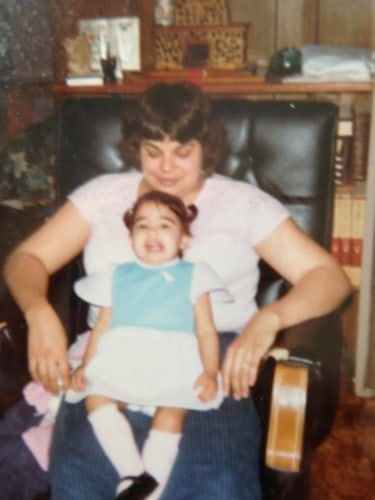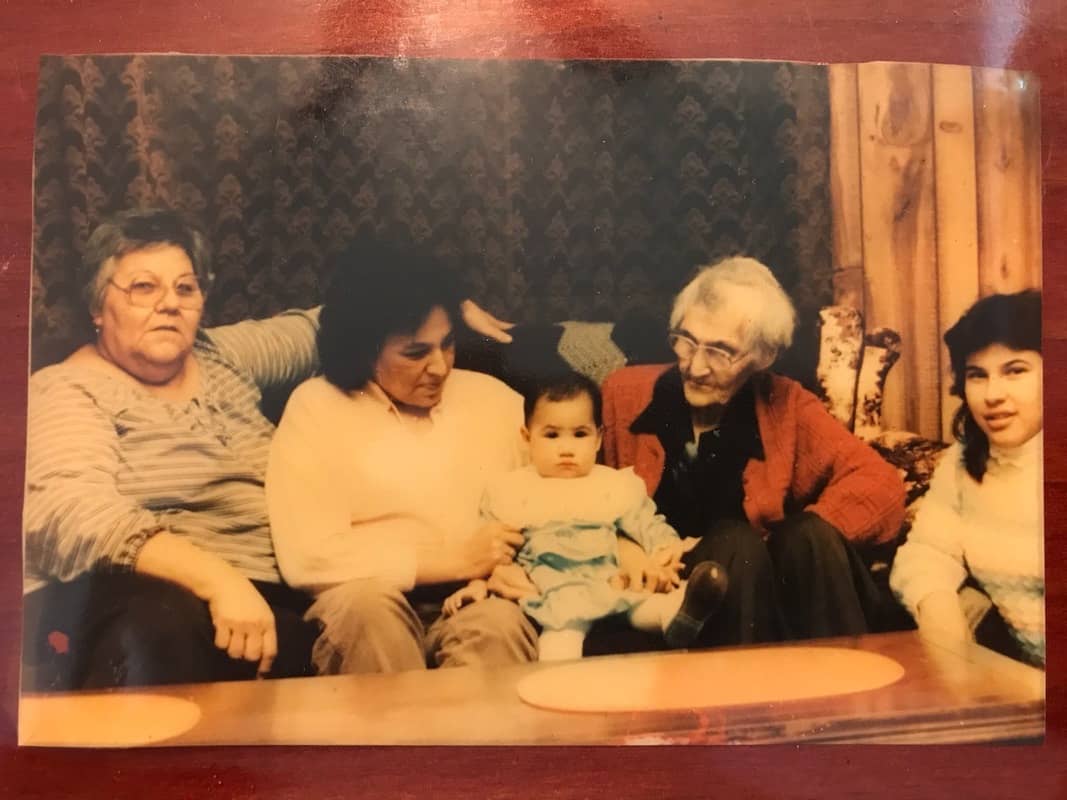I was fifteen years old and spending two weeks of my summer vacation with my best friend at her dad’s place in Sioux Lookout. I had just attended my first concert in Winnipeg and was preparing to spend the last week swimming in the lake and not stressing about the abusive environment I was living in. And then I got a phone call. It was my step dad telling me that I needed to come home right away because my grandmother was in a coma.
I didn’t know why. My grandparents were sick a lot–we all were. Hospital visits were a common occurrence in our family.
I was angry. I was frustrated. I was a moody teenager, and the last thing I wanted to do was go home. Deep inside I knew my grandma was going to be alright. It wasn’t her time to go, but I couldn’t explain that to my parents who needed me home now.
As I write this, my mother is in the hospital. I was on contract in Stratford last week when my sister told me. She is in the ICU with sepsis. Blood poisoning. She doesn’t look good. Recently, my auntie was also in hospital in Thunder Bay with all sorts of serious issues. They released her, but she has blood clots in her lungs, and there’s a potential for cancer.
I watched my ten-year-old niece feed my mother ice chips, asking if she needed anything else. She rubbed my back when she saw me crying because it was hard to see my mother in that bed with so many tubes coming out of her. She comforted my sister when she broke down the day before.
She’s ten and is already exhibiting strength and resilience that I can barely comprehend. My sister, our matriarch, is raising one hell of a warrior. And that makes sense to me, because Nathenia is also a warrior and has fought her own huge battles of pain and violence.
Over the years, I’ve watched the Indigenous women in my family fight. I may not have understood it all the time, but it resonated with me somewhere inside and I believe has given me a deep strength I oftentimes forget about or refuse to acknowledge. My great-grandmother, Helen, fought until the end. We had five generations of women alive at one time. I remember looking at the photo of these women–these Kwe–with so much pride.
I was close with my great-grandma. I have memories of sitting on her lap while she told me stories. She was medicine to me, and I’m only realizing that now. I have a memory of her in her hospital bed, and I can only think of the word opaque. Maybe it was her skin. Maybe it was the colour of the elephant key chain she gave me. But it’s my last memory of her. Hers was the first funeral I ever attended. It rained, and I was holding the hand of Auntie Dottie, her daughter who lived with her for so long. This is my memory. Maybe it’s skewed or wrong but it’s what I see. Rocking chair. Afghan. Elephant keychain. Rain. Opaque.
It’s easy for me to remember all of the death. All of the funerals. The luncheons. The tiny sandwiches. The sickness. The tears. The sad church music. Hospice.
What I forget sometimes is the fight.
These women were in and out of the hospital because they were fighters. Because they weren’t going to let things like cancer or diabetes stop them. Say what you want, but I can tell you that Native women are stubborn and will only be going out on their own terms.
Like many Indigenous families, we have been plagued with addictions and substance abuse. I know some of the Kwe in my family have struggled and continue to struggle with this sickness. We have suffered through sexual abuse, physical abuse, abandonment and pain that some will never know. And it’s reoccurring. Over and over again, for years sometimes; one or all of these afflictions. And yet we get back up. We keep going. We try again. Sometimes it’s for ourselves. Sometimes it’s for our kids or our families. Sometimes it’s just because we have to. We must. We have accused our abusers and looked them in the face. Stopped them. Took them down. And some of us haven’t. But we go through the day with that poison inside of us and oftentimes, you wouldn’t even know it. I know some have overcome addictions and some have not. The point is, they keep fighting to get through the day.
I was raised by generations of strong Native women. Growing up on the rez, I was lucky enough to have my aunties and cousins surrounding me. They taught me how to fight back, how to be vulnerable, how to ask for help, how to keep myself safe. Even now, I can see how fortunate I am to be surrounded by so many incredible Indigenous women. I’ve had the opportunity to work with many of my sisters, and each time I meet a new Kwe, I feel a deeper sense of rooted self. I can see the red matriarch rising.
Whether we’re aware of it or not, Indigenous women have to fight all the time. Disease, illness, lateral violence, addictions, intergeneration trauma, not to mention a huge statistical target on our backs that we may become missing or murdered. We have to fight to be heard. We have to be louder than everyone (which isn’t hard sometimes–have you heard a group of Native aunties laughing?) In a country that continues to disenfranchise and disappear us, we are constantly navigating our survival. Constantly fighting against being reduced to a stereotype.
And we are leaders. We are artists. We make you laugh. We’re good listeners. We are nurses. We are academics. We are beaders. We are moccasin-makers. We are water protectors. We are mothers, daughters, aunties, grandmas, sisters, nieces. We are caregivers. We are drummers. We are lawyers. We are members of parliament. We are governance officers. We are singers. We are storytellers. We make you smile. We are still here. We are loud, and we have a lot to say.
We carry the weight of the world and the sorrow and trauma of our people on our shoulders. That may sound dramatic, but it’s true. Our load is heavy.
My grandmother pulled through that coma and fought her way to live a handful of years longer. When she did go, I sang at her funeral. I didn’t think I could do it. I struggled a lot, but with the support of the other women in the community and the women in my family, I did it.
My mother has been through a lot. She wasn’t given the proper tools and skills to survive in this world, but she managed to find a way. She gave birth to three girls. All fighters like her. We’ve had our fair share of discourse over the years, of not understanding each other. I had resentment for a lot of reasons for so many years, but when I was able to see her as an Indigenous woman and not just my mother, a lot changed.

She is a stubborn-ass woman, so I feel like this isn’t her time. Like I felt it wasn’t my grandmother’s time. I was scared a few days ago–I won’t lie. I kept thinking that I wasn’t ready to lose my mother. She’s been moved out of the ICU and it looks like she’s on the mend. I also worry about my auntie, who is like another mother to me, but I’ve seen her fall into deep, deep pits and still manage to claw her way back up and out. Resilience.
I fear so much when I look at my niece and the other young girls in my family. They are up against a world of uphill battles just because of who they are and where they come from. But, by this point, I have learned to never question the strength of Indigenous women. We are rising. We continue to rise.



 Follow Us On Instagram
Follow Us On Instagram
